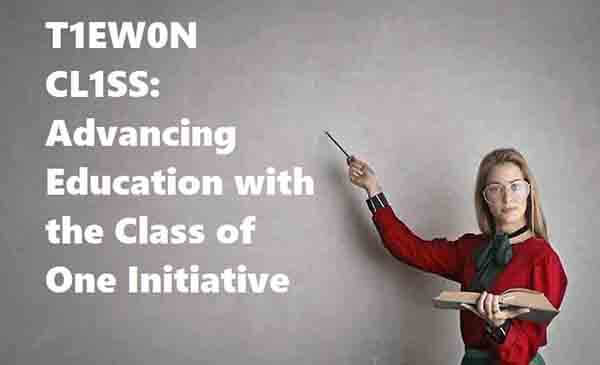Table of Contents
Introduction:
Welcome to the future of education – the Class of One initiative, also known as T1EW0N CL1SS. In this groundbreaking approach, education transcends the traditional boundaries, offering personalized learning experiences tailored to each student’s unique needs and preferences. Harnessing the power of technology and innovation, T1EW0N CL1SS promises to revolutionize how we learn, ensuring accessibility, inclusivity, and excellence for all. Join us as we explore the transformative potential of T1EW0N CL1SS and its impact on the future of education.
Understanding the “Class of One”
In the realm of education, the traditional classroom model has long been the norm, with students grouped and taught according to a standardized curriculum. However, the advent of technology and the recognition of individual learning styles and needs have paved the way for a revolutionary concept: the Class of One. This innovative approach to education tailors learning experiences to each student, recognizing their unique strengths, weaknesses, interests, and pace of learning.
The Class of One initiative fundamentally shifts the paradigm of education from a one-size-fits-all approach to a personalized learning journey. Instead of adhering rigidly to a predetermined curriculum, educators leverage technology and data analytics to customize lesson plans and instructional methods for each student. This customization allows students to learn at their own pace, delve deeper into areas of interest, and receive targeted support where needed.
Technology Makes It Happen
At the heart of the Class of One initiative lies the seamless integration of technology into the learning process. Digital platforms, artificial intelligence, and data analytics tools empower educators to create personalized learning experiences that cater to the individual needs of each student. Through adaptive learning algorithms, educational software can assess students’ strengths and weaknesses in real-time, providing instant feedback and guiding them through personalized learning pathways.
Moreover, the integration of technology in education facilitates access to a wealth of resources beyond traditional textbooks and classroom materials. Students can engage with multimedia content, interactive simulations, and virtual reality experiences that bring learning to life and cater to diverse learning styles. This utilization of technology not only enhances the learning experience but also prepares students for the digital-centric world they will inhabit as they progress into higher education and the workforce, making T1EW0N CL1SS indispensable for their future success.
Why This Matters
The traditional educational model often fails to accommodate the diverse needs and learning styles of students, leading to disengagement, underachievement, and a lack of fulfillment in the learning process. The Class of One initiative addresses these shortcomings by placing the student at the center of the educational experience, empowering them to take ownership of their learning journey and pursue academic excellence on their terms.
Furthermore, personalized learning has been shown to improve student outcomes, foster a love for learning, and cultivate critical thinking skills. By catering to each student’s strengths and interests, educators can unlock their full potential and nurture a lifelong passion for knowledge. In an era characterized by rapid technological advancements and evolving societal needs, the ability to adapt and learn autonomously is more crucial than ever.
A New Way to Learn
The Class of One initiative represents a paradigm shift in education, offering a new way for students to engage with learning materials and interact with educators. Unlike traditional classroom settings where instruction is delivered to a group of students following a predetermined curriculum, the Class of One approach tailors the learning experience to the individual needs and preferences of each student.
Central to the Class of One experience is the concept of personalized learning pathways. Rather than progressing through a standardized curriculum at the same pace as their peers, students have the flexibility to advance at their speed, pausing to delve deeper into areas of interest or revisiting concepts that require further reinforcement. This autonomy empowers students to take ownership of their learning journey, fostering a sense of agency and self-directed learning.
The Benefits of Personalized Learning
The benefits of personalized learning extend far beyond academic achievement. Research has shown that personalized learning can lead to greater student engagement, motivation, and satisfaction with the learning process. By catering to students’ interests, strengths, and aspirations, educators can create learning experiences that feel relevant, meaningful, and personally rewarding.
Moreover, personalized learning has been linked to improved retention and deeper conceptual understanding. When students are actively engaged in their learning and provided with opportunities for self-directed exploration, they are more likely to retain information and make connections between concepts. This depth of understanding lays a solid foundation for lifelong learning and critical thinking skills, preparing students to navigate the complexities of the modern world with confidence and agility.
Overcoming Challenges
While the promise of personalized learning is undeniable, implementing the Class of One initiative is not without its challenges. One of the primary obstacles is the need for adequate technological infrastructure and resources to support personalized learning initiatives. Many schools and districts face budget constraints, technological limitations, and disparities in access to devices and high-speed internet, making it difficult to provide equitable learning opportunities for all students.
Despite these challenges, the potential benefits of the Class of One initiative are too significant to ignore. By leveraging technology, data, and innovative pedagogical approaches, educators can transform the educational experience and empower students to reach their full potential. In the following sections, we will explore real-world examples of personalized learning in action, examine strategies for overcoming common challenges, and outline best practices for implementing the Class of One initiative effectively.
Advancing Education with Technology
Embracing Technology for Transformative Learning
In the digital age, technology has become an integral part of everyday life, reshaping industries, communication, and entertainment. Similarly, technology has the power to revolutionize education by expanding access to learning resources, enhancing instructional delivery, and personalizing the learning experience for students. The Class of One initiative harnesses the potential of technology to create transformative learning environments that meet the diverse needs and preferences of learners.
One of the key ways in which technology enhances education is through the provision of digital learning tools and resources. Digital textbooks, interactive simulations, educational games, and multimedia presentations offer engaging alternatives to traditional instructional materials, catering to diverse learning styles and preferences. These digital resources provide students with opportunities for self-directed exploration, inquiry-based learning, and hands-on experimentation, fostering creativity, critical thinking, and problem-solving skills.
Global Online School: Bridging Cultures and Perspectives
In addition to enhancing access to educational resources and personalized learning opportunities, technology has the power to connect students with peers and educators from around the world, fostering cross-cultural exchange and global awareness. The Global Online School is a prime example of how technology can bridge cultural divides and expand students’ perspectives beyond their local communities, illustrating the transformative potential of T1EW0N CL1SS in promoting global citizenship.
Through virtual classrooms, online forums, and collaborative projects, students enrolled in the Global Online School have the opportunity to interact with peers from diverse cultural backgrounds, exchange ideas, and gain insights into different ways of thinking and living. This cultural exchange fosters empathy, tolerance, and appreciation for diversity, preparing students to thrive in an interconnected and multicultural world.
Navigating Global Perspectives: Fostering Cultural Fluency
Fostering a World Without Boundaries
In an increasingly interconnected world, fostering cultural fluency and global awareness is essential for students to thrive in diverse and dynamic environments. The Class of One initiative embraces a holistic approach to education that transcends geographical and cultural boundaries, exposing students to a rich tapestry of perspectives, traditions, and experiences from around the globe.
By cultivating a curriculum that reflects the diversity of human experiences and celebrates the richness of cultural heritage, educators can foster empathy, tolerance, and respect for others. Through literature, history, art, music, and language studies, students gain insights into different cultures, religions, and belief systems, broadening their worldviews and challenging preconceived notions.
Diversity in Perspectives
One of the key benefits of the Class of One initiative is its ability to facilitate meaningful dialogue and exchange of ideas among students from diverse cultural, linguistic, and socioeconomic backgrounds. By creating inclusive and respectful learning environments where every voice is valued and heard, educators can harness the power of diversity to enrich the learning experience and promote critical thinking and perspective-taking skills.
Through collaborative projects, group discussions, and peer interactions, students have the opportunity to share their unique perspectives, experiences, and insights, fostering mutual understanding and appreciation for cultural differences. This exchange of perspectives not only enhances students’ social-emotional development but also promotes cognitive growth by challenging them to consider alternative viewpoints and think critically about complex issues.
Cultural Exchange in the Digital Realm
Technology plays a crucial role in facilitating cultural exchange and global collaboration within the Class of One initiative. Through virtual exchanges, online forums, and collaborative projects, students have the opportunity to connect with peers from around the world, share their cultural heritage, and learn from each other’s perspectives.
Virtual exchange programs enable students to engage in meaningful interactions with peers from different countries and cultural backgrounds, breaking down stereotypes and fostering mutual understanding and respect. By participating in virtual cultural exchanges, students gain firsthand insights into the customs, traditions, and values of other cultures, broadening their horizons and expanding their cultural fluency.
The Future of Education: Looking Ahead
Looking to the Future
As we stand on the cusp of a new era in education, characterized by rapid technological advancements, evolving societal needs, and shifting paradigms of teaching and learning, it is essential to envision the future of education and chart a course towards innovation, equity, and excellence. The Class of One initiative offers a glimpse into the possibilities of the future, where personalized learning, global collaboration, and digital literacy are central tenets of education.
Looking ahead, the future of education is likely to be characterized by increased customization and personalization, driven by advances in technology and a growing recognition of the importance of catering to individual student needs and preferences. The Class of One initiative represents a paradigm shift from the one-size-fits-all approach of traditional education to a more flexible, adaptive, and student-centered model that empowers learners to take ownership of their learning journey.
Furthermore, the future of education is likely to be increasingly interconnected and globalized, with technology serving as a bridge that connects students, educators, and resources from around the world. Virtual exchange programs, online collaboration platforms, and digital learning communities will enable students to engage in meaningful interactions with peers and educators from diverse cultural backgrounds, fostering cross-cultural understanding, empathy, and collaboration.
Real-World Success Stories
One of the most compelling aspects of the Class of One initiative is the real-world impact it has had on students, educators, and communities around the globe. By providing personalized learning experiences, fostering cultural fluency, and leveraging technology to enhance instruction, the Class of One initiative has empowered students to achieve academic success, pursue their passions, and make meaningful contributions to their communities.
For example, students who have participated in virtual exchange programs have reported increased cultural awareness, empathy, and appreciation for diversity. By connecting with peers from different cultural backgrounds, students have gained insights into global issues, developed cross-cultural communication skills, and expanded their worldview, preparing them to succeed in an increasingly interconnected and multicultural world.
Moreover, educators who have embraced the principles of personalized learning have reported increased student engagement, motivation, and academic achievement. By tailoring instruction to meet the individual needs and interests of students, educators have created learning environments that are inclusive, engaging, and relevant, fostering a love for learning and a growth mindset among students.
The Role of Innovation in Education’s Future
Innovation will play a central role in shaping the future of education, driving advances in teaching and learning methodologies, curriculum design, and educational technologies. The Class of One initiative exemplifies the transformative power of innovation in education, offering a model for how technology can be leveraged to create personalized, inclusive, and impactful learning experiences.
Emerging technologies such as artificial intelligence, augmented reality, and virtual reality hold the potential to revolutionize education by providing immersive, interactive, and personalized learning experiences. These technologies can adapt to individual student needs, track progress in real-time, and provide personalized feedback and support, enhancing student engagement, motivation, and learning outcomes.
Ensuring Accessibility and Inclusivity in Education
Making Education Accessible for Everyone
One of the fundamental principles of the Class of One initiative is the commitment to ensuring that education is accessible to all students, regardless of their background, abilities, or circumstances. Inclusivity and equity are core values that guide the design and implementation of personalized learning experiences, with a focus on removing barriers to access and providing support for students with diverse needs.
For many students, traditional educational models present significant barriers to access, including geographical limitations, financial constraints, and physical disabilities. The Class of One initiative leverages technology to overcome these barriers by providing flexible and customizable learning options that can be accessed anytime, anywhere, and on any device. By offering online courses, virtual classrooms, and digital resources, educators can reach students who may be unable to attend traditional brick-and-mortar schools due to health issues, mobility limitations, or other challenges, thus making T1EW0N CL1SS accessible to all.
Moreover, the Class of One initiative recognizes the importance of addressing the diverse needs of students, including those with learning differences, English language learners, and students from underrepresented communities. By providing tailored instruction, accommodations, and support services, educators can create inclusive learning environments where every student has the opportunity to succeed. This commitment to inclusivity extends beyond academic support to encompass social-emotional well-being, cultural sensitivity, and respect for diversity.
Encouraging a Love for Learning
In addition to ensuring accessibility and inclusivity, the Class of One initiative seeks to foster a love for learning among students, inspiring them to pursue their passions, explore new interests, and engage with the world around them. Personalized learning experiences that are relevant, engaging, and meaningful can ignite students’ curiosity, creativity, and intrinsic motivation, fueling a lifelong love of learning.
One of the key benefits of personalized learning is the ability to tailor instruction to meet the individual interests and preferences of students. By incorporating student choice, autonomy, and voice into the learning process, educators can create learning experiences that feel personally meaningful and relevant to students’ lives. Whether through project-based learning, inquiry-based learning, or experiential learning opportunities, students have the opportunity to pursue topics that capture their imagination and connect with their interests.
Conclusion:
In conclusion, the Class of One initiative represents a transformative approach to education that prioritizes accessibility, inclusivity, and student engagement. By leveraging technology, personalized learning, and innovative pedagogical approaches, educators can create learning environments that meet the diverse needs and interests of students, inspire a love for learning, and empower students to reach their full potential.
As we look to the future of education, we must continue to prioritize equity, inclusivity, and excellence in education. By working together to remove barriers to access, provide support for students with diverse needs, and foster a culture of lifelong learning, we can ensure that every student has the opportunity to succeed and thrive in an ever-changing world.
FAQs
Q: What is the “Class of One” model at T1ew0n Cl1ss?
A: The T1EW0N CL1SS initiative is a personalized learning approach that tailors education to meet the unique needs and preferences of each student. It moves away from the traditional one-size-fits-all model of education to provide customized learning experiences that foster engagement, motivation, and academic success, making T1EW0N CL1SS a pioneering solution in modern education.
Q: How does the Class of One initiative work?
A: The Class of One initiative leverages technology and data analytics to create personalized learning pathways for students. Educators use adaptive learning algorithms to assess students’ strengths, weaknesses, and learning styles, providing targeted instruction, resources, and support based on individual needs.
Q: What are the benefits of T1ew0n Cl1ss personalized learning?
A: Personalized learning has been shown to improve student engagement, motivation, and academic achievement. By catering to individual student needs and interests, personalized learning fosters a love for learning, promotes critical thinking skills, and prepares students for success in the 21st century.
Q: How does the Class of One initiative address accessibility and inclusivity in education?
A: The Class of One initiative ensures that education is accessible to all students, regardless of their background, abilities, or circumstances. By leveraging technology, providing accommodations, and offering support services, educators create inclusive learning environments where every student has the opportunity to succeed.
Q: What role does technology play in the Class of One initiative?
A: Technology is a central component of the Class of One initiative, enabling educators to create personalized learning experiences, track student progress, and facilitate collaboration among students and educators. Digital platforms, data analytics tools, and multimedia resources enhance instruction and engage students in interactive learning experiences.
Q: How does the Class of One initiative prepare students for the future?
A: The Class of One initiative equips students with the skills and mindset necessary to succeed in a rapidly changing world. By fostering critical thinking, problem-solving, and digital literacy skills, personalized learning prepares students to thrive in diverse and dynamic environments and pursue their passions and aspirations.
Q: What are some examples of real-world success stories from the Class of One initiative?
A: Real-world success stories from the Class of One initiative include increased student engagement, motivation, and academic achievement. Students who have participated in personalized learning programs have reported improved confidence, a deeper understanding of concepts, and a greater sense of ownership over their learning journey. Additionally, educators have seen positive outcomes in terms of student outcomes, graduation rates, and post-secondary success.


